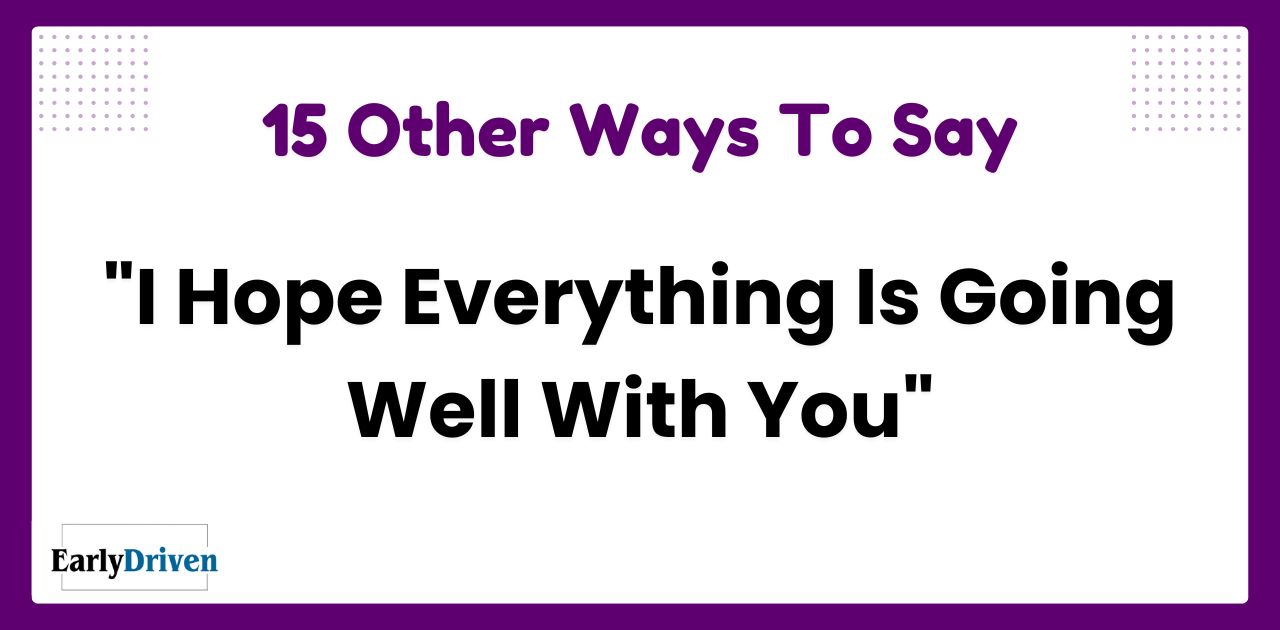In professional and personal communication, finding fresh ways to express care and interest in others’ wellbeing can strengthen relationships and make our messages more meaningful. The common phrase “I hope everything is going well with you” has become overused, potentially losing its genuine impact. This guide explores thoughtful alternatives that maintain professionalism while conveying authentic concern.
Understanding the Purpose of “Hope All Is Well”
The intent behind “hope all is well” extends beyond mere politeness – it serves as a bridge to meaningful dialogue and shows genuine interest in someone’s wellbeing. However, using more personalized alternatives can help create stronger connections and demonstrate genuine care and concern.
Other Ways to Say “I Hope Everything Is Going Well With You”
Let’s explore fifteen professional alternatives that maintain warmth while avoiding staleness. Each option serves different contexts and relationships, allowing for more engaging communication.
- Trust You’re Well
- Checking In
- Hoping All Is Good
- How Are You?
- Everything Good?
- Wishing You Well
- Trust You’re Good
- Well Wishes
- Any News?
- Are You Okay?
- All Good?
- Trust You’re Okay
- Wishing You the Best
- How’s It Going?
- Well and Happy?
1. Trust You’re Well
In professional settings, “Trust you’re well” carries an air of sophistication while maintaining approachability. This phrase is particularly effective in business correspondence where you want to demonstrate both respect and genuine interest in the recipient’s wellbeing without being overly familiar.
Example: “Trust you’re well as we approach the final quarter. Our team has been making significant progress on the Anderson project, and I wanted to share some key developments that might interest you…”
2. Checking In
“Checking in” presents a direct yet caring approach that works well in both formal and semi-formal business contexts. This phrase demonstrates proactive interest in someone’s status while maintaining professional boundaries. It’s particularly effective when following up on previous interactions or during ongoing projects.
Example: “Checking in after last week’s strategic planning session. Your insights about market expansion were particularly valuable, and I wanted to explore some of those ideas further…”
3. Hoping All Is Good
This phrase strikes an optimal balance between professionalism and warmth, making it suitable for various business communications. It conveys genuine interest while maintaining appropriate professional distance.
Example: “Hoping all is good with your department’s transition to the new software system. I’ve been reviewing the implementation metrics, and I’d appreciate your perspective on…”
4. How Are You?
Though simple, “How are you?” remains one of the most effective professional greetings when delivered with genuine interest. In business communication, this direct approach can foster authentic dialogue while maintaining professional decorum.
Example: “How are you? I’ve been reflecting on our discussion about the quarterly targets and wanted to share some additional insights that could help optimize our approach…”
5. Everything Good?
This concise yet engaging phrase works well in professional settings where you’ve established a comfortable rapport. It demonstrates concern while keeping communication efficient and focused.
Example: “Everything good? I noticed the exceptional results from your team’s recent customer satisfaction survey and wanted to discuss how we might implement similar strategies across other departments…”
Read Also: 15 Other Ways to Say “Hope All Is Well”
6. Wishing You Well
“Wishing you well” conveys thoughtful professionalism while maintaining appropriate boundaries. This phrase works exceptionally well in formal business correspondence and situations requiring a touch of gravitas.
Example: “Wishing you well as you guide the Asia-Pacific expansion. Having reviewed the preliminary market analysis, I wanted to offer some additional resources that might benefit your strategic planning…”
7. Trust You’re Good
This phrase combines professionalism with a subtle warmth, making it ideal for ongoing business relationships where you’ve established a comfortable rapport while maintaining professional boundaries.
Example: “Trust you’re good following the successful product launch. The market response has exceeded projections, and I wanted to discuss potential opportunities for scaling our distribution network…”
8. Well Wishes
“Well wishes” offers a formal yet warm opening that’s particularly effective in professional correspondence requiring a degree of ceremony or respect. It’s especially useful in communications with senior stakeholders or formal business situations.
Example: “Well wishes as you prepare for the board presentation next week. Based on our previous strategy discussions, I’ve prepared some additional market analysis that might strengthen your proposal…”
9. Any News?
This invitational phrase demonstrates professional interest while creating space for meaningful dialogue. When used appropriately, it encourages open communication while maintaining professional standards.
Example: “Any news from the European market research initiative? Our strategic planning team has identified several promising opportunities based on preliminary data, and I’d value your perspective on…”
10. Are You Okay?
In professional contexts where genuine concern is warranted, “Are you okay?” demonstrates emotional intelligence while maintaining appropriate boundaries. This phrase should be used thoughtfully, particularly when there’s an established professional relationship.
Example: “Are you okay following the extensive system migration project? I understand the challenges your team has been managing, and I wanted to discuss additional support resources we could provide…”
11. All Good?
This concise yet engaging phrase combines efficiency with genuine interest, making it suitable for regular professional interactions where rapport has been established.
Example: “All good? The quarterly results indicate significant progress in your division’s efficiency metrics, and I wanted to explore how we might replicate these improvements across other operational areas…”
12. Trust You’re Okay
This phrase balances professional concern with appropriate distance, making it particularly useful in situations requiring both empathy and formality.
Example: “Trust you’re okay as you navigate the merger integration process. Based on our previous discussions, I’ve compiled some best practices that might facilitate the transition…”lity.
13. Wishing You the Best
This formal yet warm expression conveys genuine goodwill while maintaining professional standards. It’s particularly effective in significant business communications or formal correspondence.
Example: “Wishing you the best as you prepare for the international conference presentation. Having reviewed your preliminary materials, I wanted to share some additional market insights that might enhance your discussion points…”
14. How’s It Going?
While maintaining professionalism, this phrase encourages open dialogue in a way that feels natural and engaging. It’s particularly effective in ongoing professional relationships where regular communication is established.
Example: “How’s it going with the new client onboarding process? The analytics team has identified some interesting patterns in user engagement that might help optimize our approach…”
15. Well and Happy?
This thoughtful combination acknowledges both professional and personal wellbeing while maintaining appropriate boundaries. It demonstrates emotional intelligence in professional communications.
Example: “Well and happy? Your team’s recent innovation in process automation has generated significant interest across departments, and I wanted to discuss potential applications in other areas…”
FAQ’s
Q: Is it correct to say “hope everything is going well”?
A: Yes, “hope everything is going well” is grammatically correct and professionally appropriate, though adding “I” at the beginning makes it more formal and complete in business communications.
Q: How to say “hope all is well” professionally?
A: For professional communication, you can use refined alternatives such as “Trust you’re well,” “I hope this message finds you well,” or “Wishing you continued success.” The key is matching the formality to your professional relationship.
Q: What can I say instead of I hope things are going well?
A: Professional alternatives include “Trust you’re making good progress,” “Hoping all is proceeding smoothly,” or “I trust your projects are advancing well.” Choose phrases that match your business relationship and context.
Q: How do you say hope everything is well in an email?
A: In professional emails, you can write “I trust this email finds you well,” “I hope your week is progressing successfully,” or “Wishing you continued success.” The choice depends on your relationship with the recipient and the email’s purpose.
Q: Do you say everything is going well or good?
A: In formal business communication, “well” is the grammatically correct choice, as in “everything is going well.” “Good” is typically used as an adjective rather than an adverb in professional contexts.
Q: What do you reply to hope everything is going well?
A: A professional response might be “Thank you for your kind wishes. Things are indeed going well,” or “I appreciate your thoughtfulness. All is progressing as planned.” Always maintain the same level of professionalism as the initial message.
Conclusion
Effective professional communication requires balancing warmth with appropriateness. These alternatives to “I hope everything is going well with you” provide options for various contexts while maintaining professionalism.
The key is choosing phrases that match your relationship with the recipient and the communication context. Remember that genuine interest in others’ wellbeing strengthens professional relationships and creates more meaningful interactions.
By incorporating these alternatives thoughtfully, you can enhance your professional communications while building stronger connections with colleagues, clients, and business partners.
Elevate you English Learning skills with our Mastery Blogs!

“Smith, At EarlyDriven, our dedicated team of experienced writers and journalists brings you comprehensive coverage across entertainment, celebrity news, and educational content. With expertise in digital media and a commitment to accuracy, we craft engaging stories that inform, educate, and entertain our global readership.










